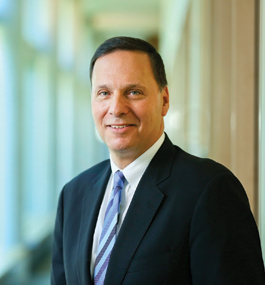From the President
A More Extroverted Profile

Mike Lovett
Ronald D. Liebowitz
The Nobel Prize awarded in October to biologists Michael Rosbash and Jeff Hall for their groundbreaking research on circadian rhythms came at a pivotal moment for Brandeis. The recognition reaffirms that our audacious 70-year-old institution is an intellectual powerhouse. It reminds us that our academic core is molded from the elements the Nobel celebrates — intellectual daring, persistence, humanistic values.
Academic excellence is the jewel in the crown; without it, we could never claim to be among the nation’s fi nest universities. The Nobel Prize gave us a singular opportunity to tell our story to the entire world. We have, with pride and gusto, and the world has responded enthusiastically. But the sense of achievement we’ve collectively felt on campus in recent months has also, by comparison, underscored an insular sensibility that has characterized Brandeis in recent decades.
This inward-looking tendency is understandable when you consider how relatively quickly Brandeis has grown into a leading research university. But it has probably also led to some missed opportunities, even in our backyard, Boston, as well as globally. This is one of the conclusions I’ve reached after 18 months of immersing myself in understanding our history, culture and aspirations.
My wife, Jessica, and I have held dozens of lunches with small groups of students, faculty and staff; pored over some 35 self-reflection reports written by faculty and staff leaders; and consulted with financial and marketing experts. It’s been a fascinating process, one that will allow us to write the next chapter of our unique story.
Recently, I’ve begun to share with the campus community several broad strategic priorities based on these findings. It’s become clear to me that we need to develop a more extroverted culture at Brandeis. Our impact should be more visible. The strength of our partnerships and the engagement of all our stakeholders depend upon it. This issue’s story on the work of Heller’s Andrew Kolodny, Peter Kreiner and the Opioid Policy Research Collaborative (“The Opioid Prophet”) is a case in point. Their work is helping to solve an urgent national public-health emergency.
In our historic focus on building our academic enterprise, we may also have lost sight of the student experience. How can we improve the undergraduate experience, nurture our doctoral students, and create clearer connections between our master’s-degree students and their career goals? What can we do to help students prepare for life’s challenges outside the classroom and the lab? How can we enrich all aspects of the student experience here?
Much of what makes Brandeis distinctive is rooted in our Jewish heritage, starting with the fact that ours is the only secular university founded by the American Jewish community. Our Jewish roots are still relevant and worthy of celebrating.
The values embedded in our Jewish heritage — a passionate commitment to learning, which places a premium on critical analysis (even self-criticism), and the desire to make the world a better place — have never been more needed than they are today.
Best regards,
Ronald D. Liebowitz
